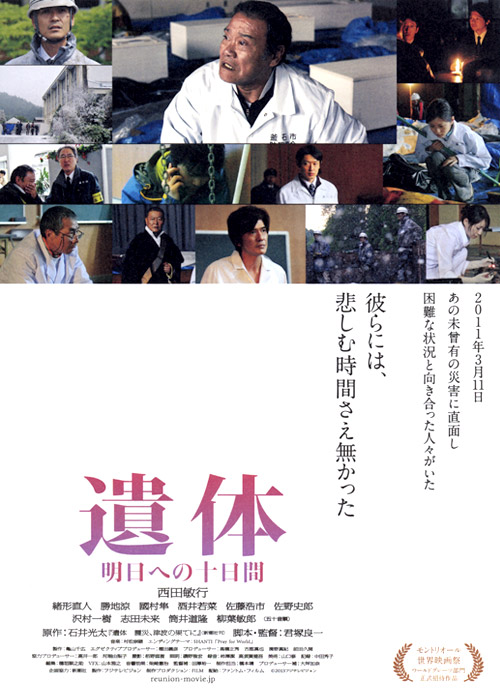“Reunion” – Film Review from Australia’s 17th Japanese Film Festival
Australia’s 17th Japanese Film Festival is soon embarking on its last city tour in Melbourne, the capital of the southern state of Victoria, after being shown around Australia in the first ever national film festival administered by the Japan Foundation. Eden Law (Fukushima-ken ALT 2010-2011, current JETAA NSW committee member) got to see some of what’s on offer during its recent run in Sydney. This one’s for you, Melbournites! Don’t say we don’t do anything for you south of the border.

If you can’t feel anything watching this, you are probably dead inside.
It has been almost three years since the disaster that devastated the north of Japan. There have since been a handful of films on the event, on the nation and it’s people as they resolutely look forward to “revival” and reconstruction. However, few of those films, I suspect, would have dealt quite so starkly and closely on the subject of death quite like “Reunion”.
“Reunion” is a dramatization of Itai: Shinsai, Tsunami no Hate ni (遺体―震災、津波の果てに?, “The Bodies at the End of the Earthquake and Tsunami”), a reportage of the events by Kota Ishii in the days immediately following the earthquake and tsunami of March 11. A brief snapshot of the normal, mundane lives around town in the beginning, contrasts sharply the aftermath, showing how unprepared and ill-equipped the small town’s public servants were, as bodies kept coming into the temporary morgue set up in the old high school gymnasium, and distraught relatives plead for information and support. Horrified by the disorganization and haphazard treatment of the dead, Aiba (played by Toshiyuki Nishida), a retired funeral home director, volunteers to oversee the proper administration of the morgue. He shows the exhausted and numbed workers how to massage limbs stiffened by rigor mortis until they became pliant again for proper positioning, and how to counsel and deal with the grieving and traumatized people who come to identify the deceased. And slowly, people carry on with their jobs, because there is very little other choice.
This will be the most heart-breaking film you’ll ever watch this year. I’ve never cried at the movies before (if there’s anybody watching), but looks like there’s the first time for everything. While the subject matter itself is undeniably powerful and emotional, “Reunion” is actually quite simple, a recounting of the events and the personal tragedies of those who survived. Music is used sparingly in this film, the silence heightening the solemnity and noises that included the constant squelching of the mud-logged boots and the sobs of the bereaved, background sounds as described in the book. Director Ryoichi Kimizuka makes sure that the deceased is an all-pervasive presence, as the cast of characters work with them and around them, uncovering their blackened swollen faces, identifying them and saying prayers for their souls. Thanks to Aiba’s character, not only are the workers brought around to empathise with the dead, as their names and personal stories are revealed, but the audience also becomes involved. Little wonder then, that at many events where this film has been screened, audiences have been emotionally devastated.
In this film where multiple stories and tragedies play out, the cast work marvellously well together. There are very little histrionics or hysteria, just numbed helplessness, as many at first wander confusedly about before being given direction by Aiba. Performances are muted and restrained, which make the break-down moments even more heart-wrenching, for everyone has their trigger, be it the discovery of a loved one’s body while carrying out work, or the tragedy of a young child, unclaimed by any surviving relatives. There are no questions of morality, no “why did this happen to us”, soul-searching, condemnation or religious debate to be had that can be adequate. From Aiba’s point of view however, the answer is to never forget one’s humanity, which can be even more precious than food, in order to survive the unrelenting horror and sorrow of the situation. And that in the end, ultimately provides a glimmer of positivity in this film, as well as in life.
Reunion (Itai: Shinsai, Tsunami no Hate ni) by Ryoichi Kimizuka, released in Japan February 23 2013, starring Toshiyuki Nishida, Naoto Ogata, Ryo Katsuji, Jun Kunimura, Wakana Sakai, Tsuneo Aiba, Kenichi Domon, Yuta Oikawa, Yoshito Shibata, Takae Oshita, Koichi Sato, Shiro Sano, Ikki Sawamura, Mirai Shida, Michitaka Tsutsui, Michio Shimoizumi, Takeshi Yamaguchi, Nobutsugu Matsuda, Yuko Terui, Daisuke Hiraga, Toshiro Yanagiba


Comments are closed.